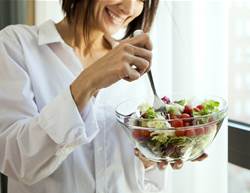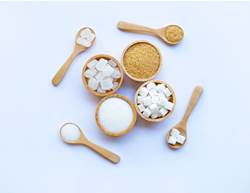Outdated, misguided, or just plain wrong suggestions come at us from all over: friends, family, the internet. But we “regular” folks aren’t the only ones who get questionable medical input; doctors and other top health experts have also heard their fair share. So we asked them to reveal the pearls of non-wisdom they hear most often, and what you should do instead to live your healthiest life.
Bad advice: Chug baking soda and water to cure a UTI
You’ll try just about anything to stop a urinary tract infection in its tracks or get rid of it fast. But stirring baking soda into water and sucking it down isn’t a smart move, says gynaecologist Dr Kiarra King. The theory is that baking soda makes urine more alkaline, supposedly reducing UTI symptoms and allowing your immune system to fight off the bacteria. But that’s not the case.
It could actually be dangerous, because wasting time on faux treatments can give the infection time to spread from the urinary tract to the kidneys. There’s another risk too: ingesting excessive amounts of baking soda can cause nausea, vomiting, diarrhea, or electrolyte imbalances.
Best advice for a UTI
Pay a visit to your doctor. They can run a urine culture test to pinpoint the exact strain of bacteria present and then determine the specific UTI antibiotic that would work best to eliminate it; this helps fight antibiotic resistance, explains Dr King. And to assist in preventing recurrent infections, stay well hydrated, as peeing regularly helps flush bacteria from the bladder.
Bad advice: You don’t need to wear sunscreen under a t-shirt
Dermatologists see right through this common misconception, says dermatologist Dr Mona Gohara. Everyday tees aren’t made of fabric with ultraviolet protection factor (UPF), so they allow about 20% of UV rays to get to your skin. If you regularly spend time outside, “that’s more than enough exposure to cause trouble,” says Dr. Gohara. The skin underneath is still susceptible to sunburn, wrinkling, and skin cancer.
Best advice for skin protection
When you’re planning to have fun in the sun, wear clothing (tops, bottoms, hats) with a built-in UPF of 50 or higher; the Skin Cancer Foundation considers this one of the most effective methods of UV protection. But slathering sunscreen on areas that are left exposed is still a must. Use a broad-spectrum sunscreen with an SPF of at least 30 and reapply every two hours, says Dr Gohara. Don’t forget easy-to-skip regions like your lips and eyelids plus the tops of your ears and feet.
Bad advice: If you can walk on it, it’s not broken
“I hear this one all the time,” says orthopaedic surgeon Dr Clifford L. Jeng. “When patients can still walk [after a foot or ankle injury], often they don’t seek medical attention and then they come in six weeks later because it’s still hurting and we find a fracture,” Dr Jeng says.
Delaying proper treatment for a broken bone can make your recovery process longer and more complicated; when initially a cast or boot might have done the trick, waiting to get help may mean you need surgery or metal plates and screws to fix the problem. Improper treatment may also cause the break to heal out of alignment, which could lead to issues like arthritis down the line.
Best advice for a foot or ankle injury
No need to immediately hobble to urgent care for every stubbed toe. Unless you’re in incredible pain or something looks obviously deformed, stay off your feet as much as possible and follow RICE protocol for a few days, says Dr Jeng.
That stands for rest, ice (20 minutes at a time, several times a day), compression (with a light bandage), and elevation. But if pain and swelling stick around for more than a week or get worse, see a doctor, who can use X-rays or an MRI to check for fractures.

Bad advice: Go ahead and clean your ears with cotton swabs – just don’t dig
Cotton swabs are great for just about everything except what we all think they’re supposed to do: clean out earwax. “It actually says on the package that these should not be used in the ears,” says otolaryngologist Dr Hamid Djalilian.
Twisting one around in your ear might feel good, but it’s a big no-no for a few reasons. You may injure the fragile ear canal skin or the eardrum or push wax in deeper, leading to temporary hearing loss as it accumulates in the canal. Besides, our ears need a little wax to help prevent bacteria, water, and other particles from finding their way in.
Best advice for ear cleaning
Ears are self-cleaning, so let your earwax be, says Dr Djalilian. If excess wax bothers you, ask your doctor if it’s safe to try an over-the-counter wax-softening kit or if you’re a candidate for professional removal.
Bad advice: If you take vitamins and supplements, your diet doesn’t much matter
Popping a multivitamin or a supplement isn’t wrong, but these aren’t magic pills. The quality of your diet is still very important.
“These products can help fill in nutrient gaps where you may be falling short, and in some instances higher amounts of specific nutrients can help manage certain conditions, but they aren’t a replacement for eating a healthy, well-balanced diet,” says dietitian Joy Bauer. Also, it can be tricky to determine the right dose on your own, and if you’re taking more than your body can properly absorb, you’ll end up simply eliminating it when you go to the bathroom.
Best advice for a healthy diet
Focus on whole foods, says Bauer: “I’m talking plenty of fresh vegetables and fruits, whole grains, heart-healthy fats, and lean proteins.”
These types of nutritious foods contain an array of vitamins, minerals, and other compounds that help the body absorb them and assist them in doing what they’re supposed to do, whether that’s supporting strong bones and good digestion, bolstering your immune system, keeping your eyesight healthy, or protecting your brain health or your heart.
“There are so many wonderful, health-promoting nutrients found naturally in foods, and these compounds often work synergistically to confer benefits,” Bauer says. If you do need to take a supplement to address a specific deficiency or issue, talk to your doctor or a dietitian for help in finding the right dose and a quality brand.
Bad advice: Don't weight train if you want a lean look
Pumping some iron won’t make the average person look overly muscular, promises personal trainer and weightlifting coach Venus Davis. To build noticeably large muscles, “one would have to lift significantly heavy weight five to six days a week while doing minimal cardio and following a meticulously structured diet,” she says.
Best advice for working out
Strength training is actually very important. “No matter what your fitness goal is, strength training of some sort should be included,” Davis says. “It’s essential to support mobility and flexibility and bone and heart health, and it reduces your risk of heart disease and diabetes.”
Aim to incorporate weight work with dumbbells or kettlebells and cardio (any activity that interests you and gets your heart rate up counts!) into each workout. Don’t forget to add a bit of core work and stretching too.

Bad advice: As long as a food doesn’t smell bad, it’s safe to eat
Even if you have the world’s most sensitive sniffer, smell alone isn’t enough to tell if a food is safe to eat. “Bacteria you can’t see, smell or taste are the most dangerous,” says dietitian Isabel Maples.
Some of the most common foodborne germs (salmonella, norovirus) and the most dangerous ones (E. coli, listeria) don’t make food smell bad.
Best advice for food safety
Your safest bet to avoid a night on the toilet (or worse!) is to decide whether something is edible or not based on how long it’s been around. Temperature-sensitive food shouldn’t sit out longer than two hours; leftovers should be tossed after three or four days; and eggs, meat and seafood need to be cooked to the recommended temperature. Maples says. Also factor in “use by” dates and how thoroughly cooked food is — and of course if something smells or looks gross, toss it.
Bad advice: If you struggle with anxiety, the best way to deal with it is to avoid what causes it
Avoidance is a natural reaction, but instead of helping, it may actually make your anxiety worse, says anxiety expert Haley Neidich.
“Anxiety will insist on being felt,” she says, and hiding from it can have secondary effects. “Not speaking up in relationships, procrastinating and avoiding social interactions or bills all have serious consequences,” she notes.
Best advice for anxiety
When you’re in a situation that makes you feel anxious, practice acknowledging your anxiety — this can help you learn coping skills for the next time you’re feeling a similar way.
“Saying to yourself, Yup, I’m anxious; I feel it in my chest; I feel like I’m losing it sounds simple, but it can reduce your symptoms immediately, and it puts you in a place of problem-solving rather than denying reality,” Neidich says.
You can also talk to a therapist about medication options, if that’s something you’re open to, or ask them about exploring exposure therapy, a common treatment for anxiety that’s the opposite of avoidance: people approach the things they fear in a safe environment and, by doing so, learn that they can handle them; sometimes the exposure is gradual, and it may come either through virtual reality in the safety of a therapist’s office (for example, taking a simulated flight to overcome a fear of flying) or out in the “real” world.

All-star health advice to start following today
These wellness to-dos from top health experts have stood the test of time.
“Your bed is only for sleeping. Don’t bring your laptop there, and put that phone away! This will create an association in your mind between your cozy bed and sleep. If you can’t nod off within 20 minutes after you’re tucked in, get up and do something relaxing in very low light in another room, then go back to bed only when you’re drowsy enough to fall asleep.” — sleep specialist Dr Raj Dasgupta
“Design a morning routine. It doesn’t take much—between 15 and 30 minutes is perfect. Consider incorporating a brief action from each of these areas: gratitude, reflection, journaling, physical wellness, mindfulness. Your rituals can be simple, such as stretching for a few minutes or focusing on being in the moment while doing your usual a.m. tasks. Don’t overthink it: These should enhance your day, not create more work or more stress.” — Neuropsychologist Judy Ho
“Don’t be afraid of ageing. Try to view getting older as a new stage of opportunity and strength that you’re in control of. Instead of dreading the changes you will experience (from menopause to the mammogram milestone), have an open conversation with your doctor about what to expect and what available options can help you cope and thrive.
"This will not only prepare you for what’s next, but also help you feel empowered and give you the confidence to accept and own your health journey.” — gynaecologist and women’s health expert Dr Jessica Shepherd
“Sing in the shower (or the kitchen, or car!). This might be surprising advice from a dermatologist, but singing is a great form of stress relief, and bringing down stress is an important key to healthy skin. Stress spikes the hormone cortisol and can lead to hair loss, worsened acne, and accelerated skin aging and trigger inflammation that may cause skin issues. It’s easier to tell patients to sing than to just tell them to manage stress.” — dermatologist Dr Mona Gohara
“Drink more water. Staying adequately hydrated is important for just about everything: energy, mood, digestion, cognition, sleep, organ function, and so much more! Plain old H2O is great, but you can soak up even more hydration by finding ways to make sipping fun and flavourful.
"I like to keep flavoured sparkling water on hand, and you can also add fresh fruit (like lemon in your water), veggies, or herbs to your water. Or try exploring different types of herbal tea!” —dietitian Joy Bauer
“Keep up with yearly checkups and say yes to blood work. Blood testing can screen for hormone imbalances, vitamin and mineral deficiencies, and a host of other things to provide insights that will help you work with your doctor to optimise your health and correct problems before they become serious.” — internist Dr Shirin Peters
“Try an electric toothbrush. It offers benefits manual ones don’t. These brushes often have timers to help you brush for the proper amount of time, and they’re more thorough. You also get a brushing boost, as the vibrations disrupt bacteria that could harm gum health or cause infection.” — dentist Randy Houska









